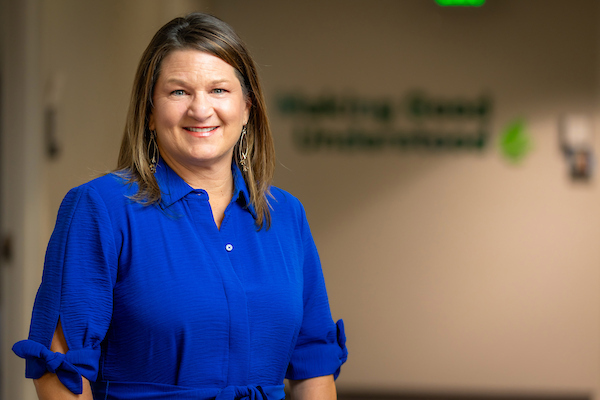Ethics Initiative brings core tenets under one roof
This story is part of a series of features highlighting the managing directors of the University's strategic initiatives. The managing directors are key (senior) staff members who work directly with the faculty directors to help implement and operationalize the vision for the initiatives, oversee initiative staff, and serve as thought partners for the faculty directors.
For nearly two decades as a University employee, alumna Angie Appleby Purcell has dedicated herself to the Notre Dame mission. Not just in pastoral theology, where she got her start in the Department of Theology, but also in a variety of other units on campus: directing the spirituality program for the ND Alumni Association, working with Campus Services and the Provost’s Office while in the University’s Leadership Rotation Program, overseeing several global sites with Notre Dame Global, and now, helping to lead the Institute for Ethics and the Common Good, the primary administrative home of the University’s Ethics Initiative.
“I am so grateful for the many small and large ways Notre Dame has supported my professional and personal growth. As a student, I was formed by some incredible, prophetic mentors—Father Don McNeill, C.S.C., Professor Catherine LaCugna, and yes, Father Ted [Hesburgh], all who brought to life the principles of Catholic social tradition and often reminded me that God’s gratuitous love is always available to us. Extremely powerful if you pause to think about that,” Purcell reflected.
The Saint Mary’s College and Notre Dame divinity graduate has always been drawn to roles that translate the core values of the Catholic social tradition into practical and formative ways to care for and accompany one another, particularly those on the periphery. Noted for her pastoral sensibilities, Purcell is also a pragmatist and problem-solver who admits that she has a healthy competitive side. Her role as managing director of the Ethics Initiative and institute requires all of these attributes.
“Being part of the University’s ambitious goal to be among the world’s leading institutions for the study of foundational and applied ethics . . . leveraging our distinctive Catholic mission . . . and coming to work every day where I can draw upon my faith to help cultivate the next generation of moral leaders is incredibly rewarding,” Purcell said. She also credits Meghan Sullivan, the founding director of the institute, for her “incredible vision and deep commitment to broad ethical inquiry in service to human dignity, human flourishing, and the common good.”
Prioritizing ethics
Purcell works hand-in-hand with Sullivan to develop and implement the institute’s strategic plan, working closely with deans and department chairs to support faculty hiring priorities in ethics, building partnerships with external collaborators, and overseeing the administrative, operational, and financial components of the institute. The Ethics Initiative serves the University by helping to build a more robust scholarly infrastructure in ethics that is distinctive because of Notre Dame’s Catholic mission, and it seeks to raise the University’s reputation as a premier global destination for the study of ethics by addressing some of the most significant ethical issues of our time, according to Purcell.
The Ethics Initiative is in no short supply of topics in which interdisciplinary research and critical engagement of real use-cases are needed. Technology ethics, particularly through the ND-IBM Technology Ethics Lab; environmental ethics; business ethics—these are just some of the areas where the Ethics Initiative supports faculty, postdocs, doctoral students, and undergraduates in their research and course development.
“The areas of applied ethics are many, and while we may not be able to tackle all of them, all at once, through our fellowship programs and program chair model we are committed to cultivating an interdisciplinary environment in which scholars and scholars-in-training, along with practitioners such as nonprofit leaders, are integrated as a cohort of learners,” Purcell said. “We think having such a diverse group of people under one roof, bringing theory and practice together, is a key ingredient to positively addressing complex ethical dilemmas.”
Another vitally important ethical tradition that is a core tenet of the Ethics Initiative is virtue ethics, a focus President Emeritus Rev. John I. Jenkins, C.S.C., emphasized during his tenure. In 2024, the University established the Jenkins Center for Virtue Ethics. Since stepping down as University president, Father Jenkins and the institute have formed a space for research and formation that advances human flourishing in both moral and spiritual contexts.
“We are thrilled to have recently received a large grant from the John Templeton Foundation to build a network of scholars, students, nonprofit leaders, and others who will advance our thinking of love as the foundation of ethics. This is a key extension of the Jenkins Center for Virtue Ethics,” Purcell said. “More than ever, we need to renew our commitment to a love ethic that strengthens our social and interpersonal relationships and reorients our individual and communal actions towards the foundational Christian truth that we are all beloved in the eyes of God and are to treat one another accordingly.”
Opportunities for undergraduates to wrestle with morally significant questions and to cultivate in their own lives virtue-centered habits such as love, wisdom, and courage are also central to the ethical formation embedded in the Jenkins Center.
Converging rivers of thought
In a world that is increasingly divided—and with technology taking on new, unforeseen forms—the Ethics Initiative has crafted a faith-based framework to guide ethical uses of artificial intelligence. The DELTA framework, developed out of a year-long Lilly Endowment Inc. planning grant, focuses specifically on technology ethics in an ever-evolving world.
Purcell believes Notre Dame is well-positioned and has a responsibility to help positively shape society’s engagement with technological innovations such as AI. “While AI has the potential to bring real benefits, we must not lose sight of the deeper questions: What does it mean to be human? How do we make sure that authentic human relationships, justice and dignity, showing compassion for one another, being vulnerable, aren’t replaced or diminished by algorithms?”
DELTA seeks to answer these questions, or at least provide a solid basis for discussion and policy decisions. “DELTA: D-Dignity. Everyone is made in the image and likeness of God, and therefore has inherent dignity. E-Embodiment. We have bodies that are vulnerable and time-limited . . . we are embodied and are meant to be in relationship with other human bodies and not machines,” Purcell explained.
L-Love: Christian ethics is rooted in love and it is at the core of the DELTA framework, Purcell said. She and others at the Ethics Initiative believe that the rise of simulated relationships with chatbots that mimic human connection poses real danger by devaluing the sacrificial, self-giving, and authentic aspects of human relationships.
Purcell, an avid hiker and kayaker, explains that “T” speaks to the concept of transcendence. “There is a quiet, unmistakable grace in nature. If you have ever experienced a stunning sunset or taken a walk in the woods during the peak of autumn, or been mesmerized by the diligence of an ant colony taking care of its community, these are tangible signs of the Divine. It is important to remain humble in the face of such beauty. There are just some things that no machine, no artificial intelligence can recreate or replicate,” Purcell said.
These realms of thought, she said, are applicable not just to the tech industry, but also to human life and society as a whole. A-Agency: We all have agency in how we engage with one another, with technology, and with artificial intelligence, Purcell observed.
“AI is not going away, nor should it. But we do have a choice about how we engage in technology, how we make sure that the lives of the most vulnerable or underrepresented among us do not suffer as a result of AI, and that moral decisions are left to our individual and collective human consciences,” Purcell said. The Ethics Initiative, through the framework of DELTA, is not focused on the development or deployment of technology, but it is focused on the formation of human beings who then have the agency to make decisions with as much moral clarity as possible.
“People look to Notre Dame to help cultivate moral clarity. They trust us because we have a voice that is rooted in the Christian tradition. We are seen as having moral authority—not just given, but earned—and we need to work hard to retain that trust to serve the common good,” Purcell said.
The Ethics Initiative formally launched the DELTA framework at the Notre Dame Summit on AI, Faith, and Human Flourishing, held on campus at the end of September. The event convened academics, journalists, religious leaders, technologists, and others to discuss Christian ethical thought at the intersection of AI.
Three decades ago, Purcell was educated by men and women whose scholarship, moral integrity, and commitment to being in the right relationship with others had a profound impact on her. Through the Ethics Initiative and the Institute for Ethics and the Common Good, she, along with a talented and dedicated team of colleagues, works hard every day to live up to the values and virtues that formed her as a young student.
On the wall of the institute, there is a quote from Philippians 4: “Whatever is true, whatever is noble, whatever is right, whatever is pure, whatever is lovely, whatever is admirable—if anything is excellent or praiseworthy—think about such things. Whatever you have learned or received or heard from me, or seen in me—put it into practice.”
“A worthy charge, don’t you think?” Purcell said.
Get involved
Learn more about the Ethics Initiative
Discover the DELTA framework and the recent ND Summit on AI, Faith, and Human Flourishing
Additional features
Arnie Phifer, Bioengineering & Life Sciences Initiative
Originally published by at ndworks.nd.edu on September 30, 2025.
Latest Research
- Fighting for maternal healthThe United States has the highest maternal mortality rate of developed nations. An innovative postpartum care model from Notre Dame can save mothers around the globe. Read the story Originally…
- NSF Cyber SMART’s fall meeting shapes fifth year of project, legacy and future plans, and adds new memberThe U.S. National Science Foundation (NSF) Cyber SMART center gathered for its fall meeting on the University of Notre Dame campus this September. The meeting served as a checkpoint with progress reports and new projects from research leads and students…
- Slavic and Eurasian studies professor wins Humboldt fellowship to research how Russia’s religious past shapes its presentWhen Russia invaded Ukraine on Feb. 24, 2022, Sean Griffin realized his second book needed a new title. Griffin, an associate professor in the University of Notre Dame’s Department of…
- Notre Dame’s R.I.S.E. AI Conference builds interdisciplinary collaboration to inform human-centered artificial intelligenceAs artificial intelligence (AI) transforms nearly every sector of society — from healthcare and education to governance and global development — a critical question emerges: How can we conscientiously design and deploy these powerful technologies to positively impact society? This…
- University of Notre Dame joins the Global Coalition of Ukrainian StudiesThe University of Notre Dame has joined the Global Coalition of Ukrainian Studies after signing a Memorandum of Cooperation (MOC), formalized on September 24, 2025, at the Ukrainian Institute of America in New York City. Notre Dame joined four other American…
- The University of Notre Dame’s Mendoza College of Business and Industry Labs team up to inspire national security manufacturing competitiveness in the regionThe South Bend - Elkhart Region is full of manufacturing companies that are poised to grow, and Executive Master of Business Administration (EMBA) and Master of Business Administration (MBA) students at the University of Notre Dame are finding innovative ways to contribute to that growth. Earlier…













